
Topics
Democracy Now!'s Anjali Kamat reports on working-class South Asian support for New York City mayoral candidate Zohran Mamdani. South Asian voter turnout increased by 40% during the Democratic primary, contributing to Mamdani's upset victory against former New York Governor Andrew Cuomo, who is now running as an independent candidate. “We’ve had several South Asian or Indo-Caribbean candidates, and none of them elicit this response. And I think the fact that the campaign spoke to the very material issues of working-class people has, first and foremost, has really made a very significant difference,” says Fahd Ahmed, director of the South Asian community organization DRUM Beats, whose members have been canvassing for Mamdani’s campaign.
Transcript
AMY GOODMAN: This is Democracy Now!, democracynow.org. I’m Amy Goodman.
Today [sic] is Election Day all over the country. Early voting just ended in New York’s mayoral race this weekend with 735,000 ballots cast. It’s the highest early voter turnout in New York’s history for a nonpresidential race, something like four times the number of people who usually vote in early voting, as the three candidates for mayor — Democratic nominee Zohran Mamdani, former New York Governor Andrew Cuomo and Republican nominee Curtis Sliwa — closed out their campaigns.
President Trump told 60 Minutes he’s not a fan of Cuomo but would pick him over Mamdani, who he called a communist. Meanwhile, The New York Times reports former President Obama told Mamdani in a private phone conversation Saturday his campaign had been impressive, and offered to be a sounding board.
I should clarify: Tuesday, not today, is Election Day.
Zohran Mamdani’s mayoral campaign has energized communities across New York City in unprecedented ways, mobilizing nearly 100,000 volunteers for his campaign. Democracy Now!'s Anjali Kamat has been following a crucial, often-overlooked portion of Mamdani's base: working-class South Asians.
ANJALI KAMAT: It’s Friday afternoon in a quiet neighborhood in Kensington, Brooklyn. These women are members of DRUM Beats, an advocacy group for low-income South Asian and Indo-Caribbean communities here in New York. and they’re getting ready to canvass for Zohran Mamdani.
KAZI FOUZIA: So, half of the list, you’re going to cover with them. Then they will — they will find them.
ANJALI KAMAT: They split up into groups, and I followed them as they knocked on dozens of doors. Armed with colorful flyers about the campaign in Bengali and Urdu and dozens of Zohran pins, they explained why they thought Mamdani was the best candidate, and reminded neighbors about early-voting times and locations.
DRUM BEATS CANVASSER: So, November 4th is the final vote. As-salamu alaykum.
ANJALI KAMAT: Their enthusiasm was infectious, often bursting into Bengali chants of “My mayor, your mayor.”
DRUM BEATS CANVASSERS: Āmāra mēẏara, tōmāra mēẏara. Āmāra mēẏara, tōmāra mēẏara. Āmāra mēẏara, tōmāra mēẏara.
ANJALI KAMAT: And for the most part, it seemed to work. I spoke to Fahd Ahmed, who runs DRUM Beats, which stands for Desis — or South Asians — Rising Up and Moving. Their organization was among the very first to endorse Zohran’s run for mayor last year.
FAHD AHMED: Many people will say that, “Oh, well, it’s a South Asian-descended candidate, and so it must be an identity thing.” But we’ve had several South Asian or Indo-Caribbean candidates, and none of them elicited this response. And I think the fact that the campaign spoke to the very material issues of working-class people has, first and foremost, has really made a very significant difference.
ANJALI KAMAT: I also spoke to Jagpreet Singh, DRUM Beats’ political director, who’s in charge of endorsing political candidates and getting the vote out.
JAGPREET SINGH: When Zohran had come to us, to begin with, he said his base, the base he was looking at, were three planks. Number one was the leftist progressives. His second plank was rent-stabilized tenants. And the third was Muslim and South Asian communities, communities that have not been previously galvanized, have not been previously activated, usually have some of the lowest voter turnout rates. So, from the get-go, our communities were going to be a big part of his base.
ANJALI KAMAT: Kazi Fouzia moved to New York City from Bangladesh in 2008. Now she’s DRUM’s organizing director. The tireless campaigning by women like her was crucial to Zohran’s victory in the primaries. In some neighborhoods, voter turnout among South Asian and Indo-Caribbean communities doubled.
KAZI FOUZIA: Just 24/7, they are thinking how to win. Some of them work in the cafeteria in the school. Some of them also work in the retail store. Some of them are home health worker, take care of the patient. One of my leader actually restoring ship. They are not only just volunteers. They build, actually, movement.
ANJALI KAMAT: After a long evening of canvassing, they’re back at the office only to get ready for more of the same the next day and every day after until the elections.
KAZI FOUZIA: These all tired people come together and creating movement to show the world how political campaign supposed to be looked like. The early vote kick-off.
CAMPAIGNER: Six, seven million voters. In June, we won the primary because of historic numbers of new voters that turned out. We changed the electorate.
ANJALI KAMAT: Earlier this month, Zohran Mamdani addressed an excited crowd of supporters at a Bangladeshi restaurant in Jackson Heights, Queens.
ANNOUNCER: And up next now we hear from the Zohran Mamdani!
ZOHRAN MAMDANI: What we did in the primary is we increased the turnout of Muslims by 60%, the turnout of South Asians by 40%. And when I stood in front of the world and gave a speech that night, I made sure to remember the Bangladeshi aunties that knocked on the doors across this city. And people have asked me, “What will it mean to have a Muslim mayor?” What my grandmother Kulsum taught me, that to be a good Muslim is to be a good person. It is to help those in need and to harm no one. The truth of this campaign, it is a truth that believes in each one of the people in this room and their possibility. It is the truth that looks at the youngest among us and sees that they could be anything in this city, anything they want.
ANJALI KAMAT: At the Jackson Heights farmers’ market that weekend, the high school students who met Mamdani at the restaurant were still thinking about his words.
MOHINI MEHBOOBA: If I could run for mayor, I think I would have a lot of great ideas, just like Zohran, making New York City affordable. I want to be able to live here without any worry about paying rent. I know I’m just 17, but I want to be able to move out next year and experience living in the city, because I know, even for my family, it’s really hard to pay the rent. So, yeah.
ANJALI KAMAT: Mohini Mehbooba is one of the youth members of DRUM Beats. A talented artist, Mohini was giving people henna tattoos that spelled “Zohran.”
MOHINI MEHBOOBA: We work so hard phone banking, canvassing. And I love doing it, and I’m going to do some more today, hopefully. And it’s just a really good feeling to do something that will be able to change for us, as well.
PHONE BANKER: Thank you so much.
ANJALI KAMAT: At the DRUM Beats office in Jackson Heights, there’s a different group of people phone banking every afternoon. They’re reaching out to communities in a variety of South Asian languages, with volunteers making calls in Nepali, Urdu and Bengali. A group of high school students are also making calls — in between joking around.
SAMMY: Hey. My name is Sammy, and I am a high school volunteer for the Zohran Mamdani’s campaign. Have you ever heard about Zohran Mamdani? Are you planning to vote for him on the Election Day, November 4th?
ANJALI KAMAT: High school student Miftahun Mohona explains why she’s passionate about campaigning for Zohran Mamdani.
MIFTAHUN MOHONA: Even though I’m not at the age to vote, not yet, I still care about, like, people above 18, like for them to vote for Zohran, because the thing is, if they vote for the — if they vote for the right person, that also benefits me, because I live in a world where it’s very corrupt, and every action that the people over 18 taking, like voting, their action means a lot to me, as well, because I come from a working-class family. We don’t have many benefits. We don’t have much resources.
ANJALI KAMAT: Across working-class South Asian communities in the city, there’s a deep belief that Zohran Mamdani will stand up for them if he becomes mayor. A big reason for that is his role in the taxi workers’ protest against medallion debt back in 2021. When the drivers decided to go on a hunger strike, Assemblyman Mamdani joined them for the full 15 days. Kazi Fouzia remembers how moved the community was.
KAZI FOUZIA: I saw how long he’s doing the hunger strike, and he almost die in that time. So I feel this call, actually, real solidarity. Solidarity, not just come and talk and leave. Solidarity, also he put his body frontline.
ANJALI KAMAT: DRUM, or Desis Rising Up and Moving, was founded in Jackson Heights, Queens, in 2000 as a membership organization of low-wage South Asian and Indo-Caribbean workers and youth. For most of its history, their membership has faced the brunt of domestic repression and hate crimes that followed the September 11th attacks. Kazi Fouzia found herself the target of NYPD surveillance when she started organizing in immigrant Muslim communities.
KAZI FOUZIA: I came 2008 this country, and I used to work in retail store in Jackson Heights. And that time, I’m doing volunteering organizing with the DRUM, and one day I found informer behind me.
ANJALI KAMAT: A few years later, as hate crimes against South Asian immigrants spiked again, many people suggested she stopped wearing her hijab.
KAZI FOUZIA: People asked me, 2013, “You should take off your hijab because it’s not safe anymore.” We saw how much isolations and fear community have after 9/11.
ANJALI KAMAT: Jagreet Singh remembers his Sikh family members cutting their hair and beards and wearing American flag T-shirts to stay safe after 9/11.
JAGPREET SINGH: This is a reality we lived with for a long time, that we had to hide ourselves, that we had to retreat back, that we had to fight for everything that we wanted. And we’re in this reality now where Zohran Mamdani is about to become mayor of our city, a very outward Muslim man, South Asian, who is very much into his identity, who does not hide his identity.
ANJALI KAMAT: From the shadows of post-9/11 repression and fear, the Mamdani campaign has given this community a new sense of political confidence and purpose.
KAZI FOUZIA: So, if you see now our member, our community member, our religious leader, our neighbors, all now talking, talking, talking for Zohran. If they go back to 9/11 era and they try to talk about Islamophobia, xenophobia, it’s not going to sell. It’s not going to sell. It’s over. People are not going to go back the isolating zone anymore. If they try to implementing this, they will push back.
ANJALI KAMAT: If Zohran Mamdani wins the mayoral election, DRUM Beats, like other progressive groups that backed Mamdani from the start, could find themselves in a brand-new role: collaborating with the administration to govern the city. It’s been a long journey from advocating for those on the margins to potentially having a seat at the table. Here’s Jagpreet Singh again.
JAGPREET SINGH: Talks about what the administration would look like are still a little premature, but the campaign and the administration has been very willing to work with organizations like ours at DRUM Beats. It feels amazing to see that we now get to take up leadership, that we get to not only have a seat at the table but run how our city runs. It’s not just going to happen by him being in office, no matter how charismatic he is.
ANJALI KAMAT: Kazi Fouzia says that if Mamdani wins the race but is unable to keep his campaign promises down the road, their members will not hesitate to push his administration and hold their feet to the fire.
KAZI FOUZIA: Zohran make impossible possible in his grassroot movement, too, in the mayoral campaign. So Zohran have to keep his promises and fulfill his commitment. And we will be support all the time him. And also, if he don’t fulfill or keep his promises, we will hold him accountable.
ANJALI KAMAT: In the event of a Mamdani victory, his administration will not face an easy path. People like Fahd Ahmed are already preparing for how to confront the many challenges and threats that may come, whether from the Trump administration or Wall Street and real estate interests.
FAHD AHMED: Our side, there will be real challenges of trying to run a city as a left, when we don’t have extensive experience of doing that. But how it is that we govern, tending to the actual material needs that come up in day-to-day administration of the city, while having a vision that is transformative, that does believe that cities and society can be shaped differently and can function in ways that actually meet the needs of everyday working people.
MAMDANI SUPPORTERS: Zohran! Zohran! Zohran! Zohran! Zohran!
ANJALI KAMAT: But for now, the South Asian and Indo-Caribbean communities that have been pounding the pavement for Mamdani couldn’t be more excited for a potential Zohran Mamdani victory — and their new role in the spotlight.
ZOHRAN MAMDANI: We choose the future, because for all those who say our time is coming, my friends, our time is now.
ANJALI KAMAT: For Democracy Now!, this is Anjali Kamat, with Nicole Salazar. Thanks to Rehan Ansari.
AMY GOODMAN: And special thanks to Charina Nadura.
Up next, President Trump threatens to bomb Africa’s most populous country, accusing the Nigerian government of failing to protect Christians. We’ll speak with the acclaimed Nigerian writer Wole Soyinka, the first African winner of the Nobel Prize for Literature, whose visa was revoked under the Trump administration. Back in 20 seconds.


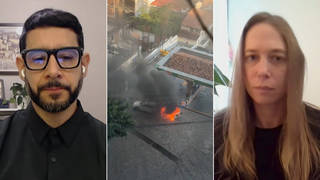
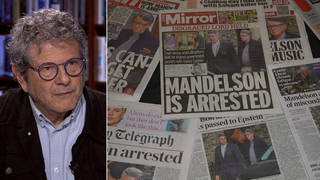
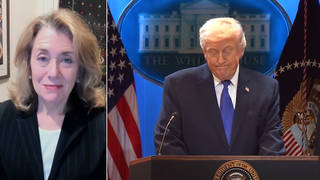





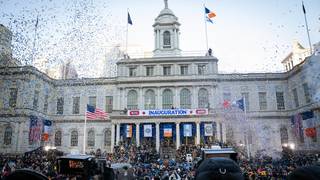
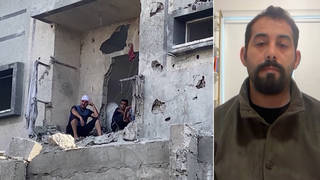
Media Options